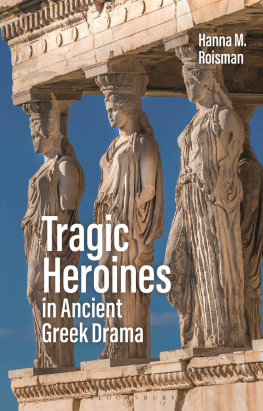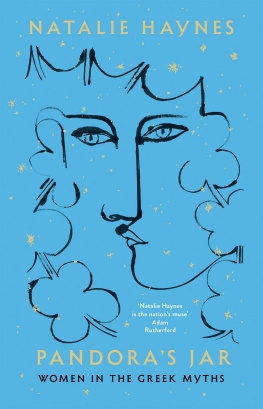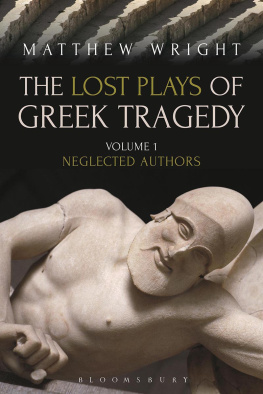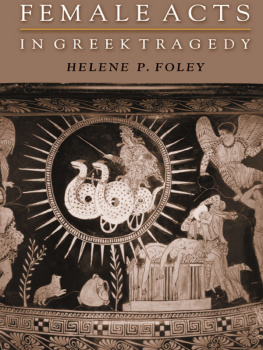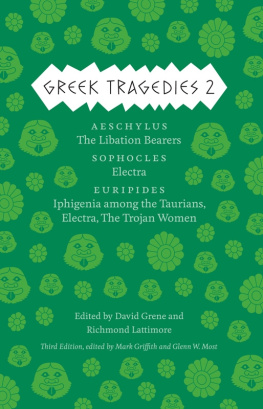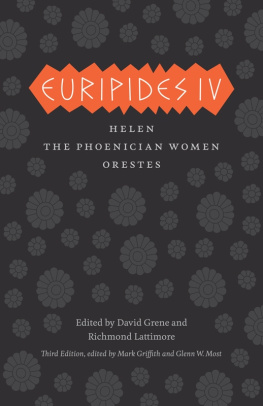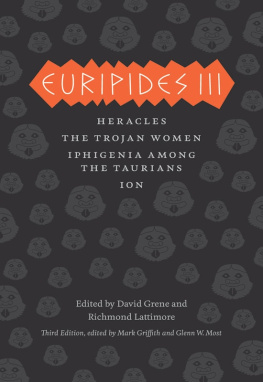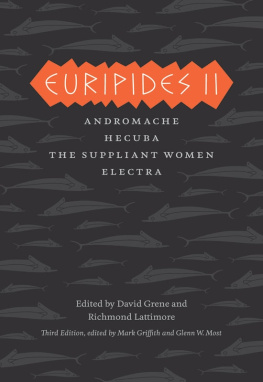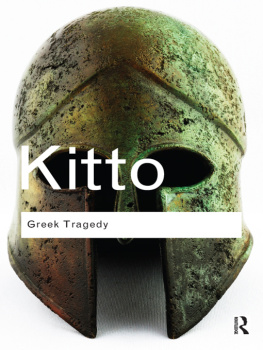Publication of this volume has been made possible in part through the generous support and enduring vision of Warren G. Moon. TROJAN WOMEN HELEN HECUBA
Three Plays about Women and the Trojan War EURIPIDES Verse translations by Francis Blessington, with introductions and notes The University of Wisconsin Press The University of Wisconsin Press 1930 Monroe Street, 3rd Floor Madison, Wisconsin 53711-2059 uwpress.wisc.edu 3 Henrietta Street, Covent Garden London WC2E 8LU, United Kingdom eurospanbookstore.com Copyright 2015 The Board of Regents of the University of Wisconsin System All rights reserved. Except in the case of brief quotations embedded in critical articles and reviews, no part of this publication may be reproduced, stored in a retrieval system, transmitted in any format or by any meansdigital, electronic, mechanical, photocopying, recording, or otherwiseor conveyed via the Internet or a website without written permission of the University of Wisconsin Press. Rights inquiries should be directed to . [Works. [Works.
Selections. English. 2015] Trojan women, Helen, Hecuba: three plays about women and the Trojan War / Euripides ; verse translations by Francis Blessington, with introductions and notes. pages cm. (Wisconsin studies in classics) Includes bibliographical references and index. paper) 1. paper) 1.
EuripidesTranslations into English. 2. Helen, of Troy, Queen of SpartaDrama. 3. Hecuba, Queen of TroyDrama. 4.
Trojan WarDrama 5. Mythology, GreekDrama. I. Blessington, Francis C., 1942, translator. II. Euripides.
Trojan women. English (Blessington) II. Euripides. Helen. English (Blessington) IV. Hecuba. Hecuba.
English (Blessington) V. Title. VI. Series: Wisconsin studies in classics. PA3975.A2 2015 882.01dc23 2015010084 For Ann Geoff Julia
Contents
Acknowledgments
I owe thanks to the following readers who read the whole, or parts, of the manuscript: Professor Guy Rotella of Northeastern University, Professors Richard Elia, Thomas Luddy, and Ann Taylor, my wife, of Salem State University. Thanks also to Lisa McGonagle for information on the law.
I am grateful to the New England Poetry Club for awarding my translation of Trojan Women the Der-Hovanessian Prize for the best translation in 2011 and to Literary Imagination for publishing a choral ode (lines 511567) from this play as The Fall of Troy. I first translated the Trojan Women at the suggestion of Meg Taintor, artistic director for the Whistler in the Dark Theatre Company, for a production in their 20112012 season. My gratitude to her and director Ben Evett and the company who participated in the staged reading and in the production. Special gratitude also to Professor Hugh K. Long for performing my translation of Trojan Women at Athens State University in 2013.
Euripides: The Philosopher of the Stage
The tragedies of Euripides challenged those of his predecessors.
If Aeschylus found that there was justice in the world, even if delayed, and Sophocles saw that man ironically could destroy himself by pursuing Greek values too far, Euripides challenged the rational foundation of civilized life itself, the philosophical basis of Plato and Aristotle. His plays investigate how futile ideas and ideals can be. But Euripides presents no easy answers. Conflicting sides have their valid claims, though not always equally right. His characters, like Hecuba, may challenge the justice of, even the existence of, the gods, but she claims we still need them. Euripides audience was made up of the sophisticated citizens of the polis (city-state), and his subject matter was often either that of the heroic era portrayed by Homer three centuries earlier or that of traditional mythology.
Yet his Heracles was not the great hero of the labors but rather a man driven by madness to kill his wife and three children. He is reduced from a hero to a man who needs a friend like Theseus just to continue living. Euripides characters are always at the extremes of life: a woman in a bacchic frenzy tears apart her son; another plots and kills her children out of jealousy at being abandoned by her husband; a god destroys a royal family because he is not worshipped; a woman is rescued from captivity and the danger of rape, and her long-lost husband saved from imminent death by the gods. The triumph of the irrational, both tragic and benign, was often his theme. His interest in the emotional side of human nature led him to investigate war and womens roles in warring societies. Homer presented war directly, but Euripides dramatizes its aftermath in these three plays.
He saw that the masculine society of ancient Greece was emotionally entwined with the opposite sex: A woman was said to have caused the Trojan War, and women suffered the consequences long after many of the heroes were dead. Female concernsfamily, identity, slavery, revenge, justice, knowledge, intelligence, religion, love, and hatewere the concerns of Euripides modern city-state that had passed beyond the Homeric world but had to cross-examine its values. Is Hecubas revenge morally just in Euripides time? Is Helens benevolent world possible? Is Hecubas endurance the true heroism? These are questions for our world, too. The popularity of Euripides today demonstrates how fundamental his plays are to human experience.
Principal Dates in the Life of Euripides
Euripides is said to have written ninety-two plays, of which nineteen survive under his name, the largest number of any ancient Greek dramatist. There are two main medieval manuscripts: one of ten plays used in schools with scholia (ancients commentaries) and nine (without scholia) from an alphabetical collection (only H through K).
At least seventeen tragedies are considered certainly by Euripides. Rhesus (date unknown) is disputed, and Cyclops is a satyr play (lighter drama). Some fragments also have survived.
| 485 (480?) | Born on the island of Salamis near Athens or at Phyla (?). |
| 480 | Persians sack Athens. Athens defeats them in the Battle of Salamis. |
| 469 | Birth of Socrates, the philosopher and friend of Euripides. |
| 456 | Death of the tragedian Aeschylus. |
| 455 (?) | First play, now lost, The Peliades. |
| 447432 | Parthenon built during the Age of Pericles. |
| 441 | First prize. Play unknown. |
| 438 | Alcestis. |
| 431 | Medea. Peloponnesian War begins between Athens and Sparta for the leadership of Greece and lasts till the defeat of Athens in 404. |
| 430 (?) | Children of Heracles. Plague in Athens. |
| 429 | Pericles dies in the plague. |
| 428 | Hippolytus. |
| 425 (?) | Andromache. |
| 424 (?) | Hecuba. |
| 423 (?) | Suppliant Women. |
| 420 (?) | Electra. |
| 416 (?) | Heracles. |
| 415 | Trojan Women. Athenian attempt to annex Sicily fails miserably. Sicilians, said to have been charmed by the songs of Euripides, release Athenian prisoners. |
| 414 (?) | Iphigenia in Tauris. |
| 413 (?) | Ion. |
| 412 | Helen. |
| 411409 | Phoenician Women. |
| 408 (?) | Orestes, Cyclops. Euripides goes to the Court of Agelaus at Pella in Macedonia. |

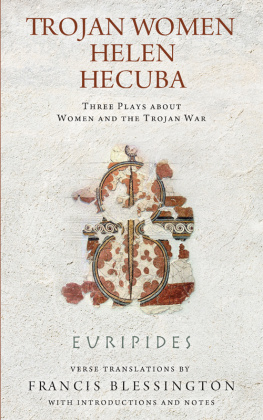
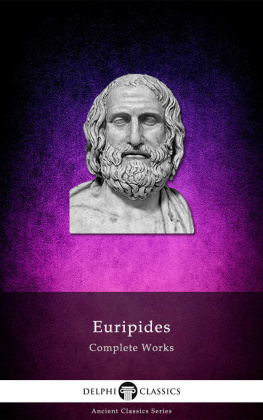
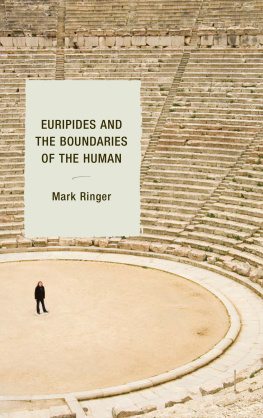

![Euripides - Classic Greek Drama: 10 Plays by Euripides in a Single File [NOOK Book]](/uploads/posts/book/43473/thumbs/euripides-classic-greek-drama-10-plays-by.jpg)


